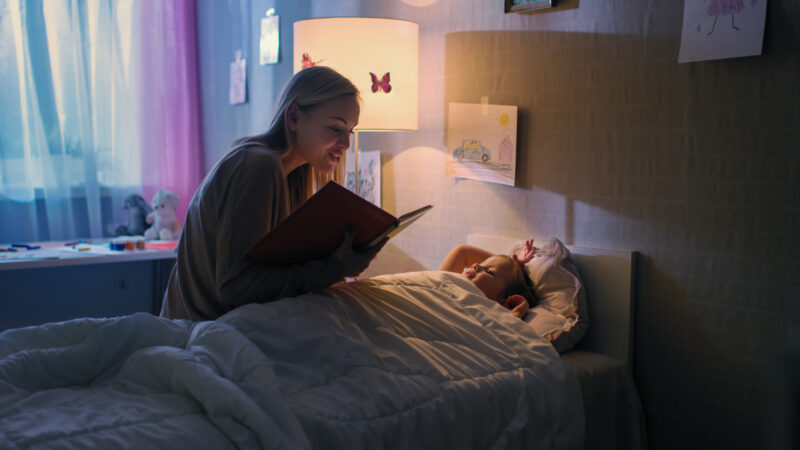In today’s techy world, one can easily become absorbed with using screens. While technology offers numerous benefits to users, like readily available educational resources, communication tools, and entertainment options, it also has shortcomings, such as disrupting sleep behaviors for children and adults. Using screens constantly, especially before bedtime, can impact children’s and adults’ sleep patterns and quality, and some families may find it challenging to get the rest they need. Let’s discuss how screen time can impact our sleep patterns and discover alternative strategies that promote relaxation and prepare our bodies for rest.
The Impact of Screens on Sleep
Children
Blue light from smartphones, tablets, and computers can disrupt the body’s sleep-wake cycle by reducing melatonin production, which is a hormone that is vital for regulating sleep (AlShareef, 2022). Children’s brains are still developing, so they are particularly sensitive to environmental stimuli and the blue light emanating from screens. Furthermore, content on digital devices is intentionally designed to keep individuals engaged, and this may keep children alert for longer periods of time and make it difficult for them to relax and drift off to sleep. Research indicates that screens in the bedroom, whether actively used or not, are linked to insufficient sleep, poor sleep quality, and daytime sleepiness (Carter et al., 2016).
Teens and Adults
In addition to disrupting circadian rhythms, using electronic devices before bedtime may cause increased tiredness, stress, and symptoms of depression in adults (Lastella et al., 2020). Adults and teens may feel compelled to stay connected and responsive late into the night for various reasons including work or school responsibilities and other societal pressures. In fact, this situation could blur personal boundaries and heighten fears of social exclusion (Saling et al., 2016). Viewing mentally stimulating or emotionally taxing activities before sleep, such as scrolling through social media, responding to emails, or binge-watching shows, can further hinder relaxation, especially if the content is negative or distressing.
Tips for Families
To help counteract the negative effects of screen time on sleep patterns, consider implementing the following strategies:
- Set electronic curfews: Pick specific times when screens must be turned off.
- Create screen-free zones: Designate bedrooms as no-screen zones so, when individuals are in them, they are free from digital distractions.
- Explore the Thrive Professional Resource guide for more tips on managing screen time and sleep guidelines.
- Sleep guidelines – page 9
- Family Media Action Plan – page 17
Transitioning away from screens might be initially challenging for members of your family, but doing this can help promote better sleep and strengthen your family connections (Mindell et al., 2018). Here are some soothing alternatives for your family’s nighttime routine:
- Read Together: Pick out some favorite books. and take turns reading aloud. This activity can be a peaceful way to end the day and bond as a family.
https://www.scholastic.com/parents/books-and-reading/reading-resources/9-tips-to-inspire-family-reading.html - Do Yoga or Stretches: Try some simple yoga poses or gentle stretches to release tension from the body and get ready for sleep. https://flowandgrowkidsyoga.com/pages/kids-yoga-poses
- Practice Mindfulness or Meditation: Help your child relax with mindfulness techniques like deep breathing or guided imagery. These activities can create calm at the end of the day. https://www.calm.com/app/kids
- Tell Stories: Create your own bedtime stories or share family anecdotes to help spark imagination and foster connection. https://www.storytyke.com/post/4-bedtime-story-starter-ideas
- Make Art or Design Crafts: Get creative with quiet art projects like coloring or crafting. It can be fun for children to express themselves as they transition to rest. https://www.pbs.org/parents/crafts-and-experiments/make-a-bedtime-routine-book
- Play Soft Music or Lullabies: Play gentle music or sing lullabies to help create a calming atmosphere in the bedroom. These activities can be a soothing signal to the brain that it’s time to relax. https://www.calm.com/app/music/kids
- Take a Warm Bath or Shower: A warm bath or shower can relax tired muscles and help everyone feel clean and cozy before bed. https://www.happiestbaby.com/blogs/toddler/bathtime-activities
- Look at the Stars or Take Nighttime Walks: If the weather is nice, spend some time outside stargazing or take a leisurely walk. Fresh air and gentle movement can help prepare the body and mind for sleep. https://www.happiestbaby.com/blogs/toddler/bathtime-activities
- Take Time to Cuddle: Take a few moments to cuddle with your child and offer hugs, kisses, and words of affirmation. Physical touch can promote security and relaxation for children and parents. https://bunniesbythebay.com/blogs/how-to-delight/4-ways-hugging-child-benefits-development
Remember, finding a balance between using screens and relaxing can help your family be happy, healthy, and rested! So, consider prioritizing activities that help you and your family unwind as bedtime approaches and connect offline!
References
AlShareef, S. M. (2022). The impact of bedtime technology use on sleep quality and excessive daytime sleepiness in adults. Sleep Science, 15, 318–327. https://doi.org/10.5935/1984-0063.20200128
Carter, B., Rees, P., Hale, L., Bhattacharjee, D., & Paradkar, M. S. (2016). Association between portable screen-based media device access or use and sleep outcomes: A systematic review and meta-analysis. JAMA Pediatrics,170(12),1202–1208. http://doi:10.1001/jamapediatrics.2016.2341
Heo, J., Kim, K., Fava, M., Mischoulon, D., Papakostas, G. I., Kim, M., Kim, D. J., Chang, K. J., Oh, Y., Yu, B., & Jeon, H. J. (2017). Effects of smartphone use with and without blue light at night in healthy adults: A randomized, double-blind, cross-over, placebo-controlled comparison. Journal of Psychiatric Research, 87, 61-70. https://doi.org/10.1016/j.jpsychires.2016.12.010
Lastella, M., Rigney, G., Browne, M. & Sargent, C. (2020). Electronic device use in bed reduces sleep duration and quality in adults. Sleep and Biological Rhythms, 18, 121–129. https://doi.org/10.1007/s41105-019-00251-y
Mindell, J. A., & Williamson, A. A. (2018). Benefits of a bedtime routine in young children: Sleep, development, and beyond. Sleep Medicine Reviews, 40, 93. https://doi.org/10.1016/j.smrv.2017.10.007
Saling, L., & Haire, M. (2016). Are you awake? Mobile phone use after lights out. Computers in Human Behavior, 64, 932–937. https://doi.org/10.1016/j.chb.2016.08.006

